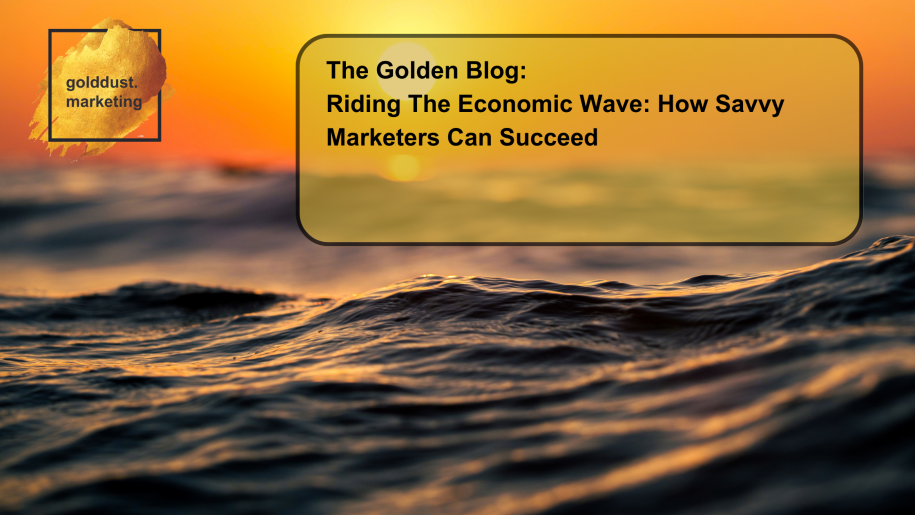Riding The Economic Wave: How Savvy Marketers Can Succeed
The ever-shifting global economy can be a tricky landscape to navigate for even the most experienced marketers. But with the right strategies and tactics, savvy marketers can stay ahead of the curve and succeed despite the volatility of the market. Let’s take at the current economic trends shaping the business landscape and explore how UK marketers can use them to their advantage.
The Current Economic Climate And Its Impact On Businesses
The global economy has had a significant impact on businesses. In the aftermath of the pandemic and various geopolitical factors, companies have had to adapt to new challenges and navigate through uncertain times. The volatility of the markets has led to fluctuations in consumer spending, supply chain disruptions, and changing consumer behaviours. Businesses have had to reevaluate their strategies and make quick adjustments to stay afloat. Some industries, such as travel and hospitality, have been hit particularly hard, while others, like e-commerce and technology, have experienced significant growth.
Understanding these shifts in the economic landscape is crucial for marketers to effectively plan their strategies and make informed decisions.
What’s more, the economic climate has also influenced consumer sentiment and purchasing decisions. With economic uncertainty, consumers are more cautious with their spending and are looking for value and quality. Marketers need to understand these changing consumer needs and tailor their messaging and offerings accordingly.
The Latest Trends In Business
The business landscape is constantly evolving, and staying updated on the latest trends is crucial for marketers looking to succeed. Several key trends are currently shaping the way businesses operate.
One prominent drift is the rise of e-commerce and online shopping. With more people working from home, online shopping has seen a significant increase. Marketers should focus on optimising their online presence, creating user-friendly websites, and implementing effective digital marketing strategies to reach their target audience.
Another trend is the increasing importance of sustainability and corporate social responsibility. Consumers are becoming more conscious of the impact businesses have on the environment and society. Brands that prioritise sustainability and engage in ethical practices are gaining favour with consumers. Marketers can leverage this trend by showcasing their company’s sustainable initiatives and communicating their commitment to social responsibility.
Personalisation is also a significant trend in the business landscape. Consumers now expect tailored experiences and personalised messaging. Marketers should use data analytics to help them understand their target audience and deliver personalised content and offers. This can lead to increased customer loyalty and higher conversion rates.
How To Stay Ahead Of The Competition With A Strong Marketing Strategy
Staying ahead of the competition requires a strong marketing strategy. To succeed, businesses must be proactive and innovative in their approach.
Firstly, it’s crucial to stay updated on the latest trends and changes in the industry. By keeping a close eye on market developments, marketers can identify new opportunities and adjust their strategies accordingly.
Additionally, understanding your target audience and their needs is key. Conduct market research, gather customer insights, and segment your audience to deliver personalised experiences that resonate with them.
Next, focus on brand messaging and positioning. Clearly communicate your unique value proposition and differentiate yourself from competitors. Highlight what sets your brand apart and why customers should choose you.
Embracing new technologies and digital marketing techniques is another essential component. With the increasing reliance on online platforms, marketers should invest in digital marketing strategies such as social media, search engine optimisation, and email marketing. Utilise data analytics to optimise campaigns and track customer behaviour.
Moreover, navigate the changing regulatory environment by staying informed about relevant laws and regulations. Ensure compliance and adapt your marketing practices accordingly. Building long-term relationships with customers is vital for sustained success. Provide excellent customer service, listen to customer feedback, and strive to exceed their expectations. A loyal customer base can be a significant competitive advantage.
Lastly, measure success through key performance indicators (KPIs) and make data-driven decisions. Regularly analyse metrics, monitor campaign performance, and make adjustments to optimise results.
Understanding Your Target Audience And Their Needs
Understanding your target audience is crucial for effective marketing. To successfully connect with your audience, you need to delve into their needs, desires, and pain points. Conduct market research, gather customer insights, and segment your audience to gain a deeper understanding of who they are and what drives them.
In addition to social media, search engine optimisation (SEO) is another crucial digital marketing technique. Optimising your website for search engines helps improve your online visibility and drives organic traffic to your site. By using keywords, creating quality content, and improving website speed and user experience, businesses can increase their search engine rankings and attract more visitors.
Furthermore, the use of email marketing continues to be a powerful tool in digital marketing. Building an email list allows businesses to nurture leads, send targeted offers, and engage with their audience directly. By crafting compelling email campaigns that provide value to subscribers, marketers can drive conversions and build customer loyalty.
Navigating & Adapting To The Changing Regulatory Environment
Laws and regulations can have a significant impact on marketing practices, and failure to comply can lead to legal consequences and damage to your brand’s reputation. To navigate the changing regulatory environment, start by staying updated on relevant laws and regulations in your industry. Keep a close eye on any changes or updates and ensure that your marketing practices align with the latest requirements. This may include obtaining necessary permissions or licenses, following advertising guidelines, or protecting customer data in accordance with data protection laws.
It’s also important to be proactive in adapting your marketing strategies to comply with new regulations. This may involve adjusting your messaging, altering your targeting criteria, or changing the way you collect and handle customer data. By being flexible and adaptable, you can ensure that your marketing efforts are in line with legal requirements and maintain the trust of your audience.
Additionally, seeking legal counsel or consulting experts in the field can provide valuable guidance and insights into the regulatory landscape. They can help you navigate complex legal issues and ensure that your marketing practices are compliant and ethical.
Building Long-Term Relationships With Customers Through Excellent Customer Service
Building long-term relationships with customers is a key component of marketing success. By providing excellent customer service, you can not only attract new customers but also foster nloyalty and retention.
One of the first steps to building long-term relationships is to prioritise customer satisfaction. Make it a priority to exceed customer expectations at every touchpoint. Respond promptly to enquiries and concerns and go the extra mile to resolve any issues. By showing customers that their needs and concerns are important to you will build trust and loyalty.
Consistency is also important in customer service. Ensure that all customer interactions, whether through phone, email, or in-person, reflect your brand’s values and level of quality. Treat every customer with the same level of respect and attention, regardless of their purchase history or current status.
Additionally, personalisation plays a key role in building long-term relationships. Take the time to understand each customer’s preferences and tailor your communication and offerings accordingly. Send personalised emails, recommend products based on their previous purchases, and provide special discounts or offers that are relevant to their interests. By making customers feel seen and valued, you can strengthen your relationship with them.
Another aspect of building long-term relationships is actively seeking customer feedback. Encourage customers to provide feedback through surveys, social media, or customer reviews. Actively listen to their suggestions and implement changes or improvements based on their feedback. By involving customers in the process and showing them that their opinions matter, you can further strengthen their loyalty and trust.
Hopefully, this crazy world will calm down soon, but whilst we’re still in this strange turbulent environment, we all need to pull together to succeed.
At Golddust Marketing we’re here to help you put the above suggestions in place. Let’s identify your unique value proposition and target audience, discover what KPIs you need to put in place for a successful marketing campaign, and nail that marketing strategy you’ve been talking about but never got round to doing.
Get in touch for an informal chat, and let’s see how we can sprinkle our golddust magic over your business, however stormy the business seas are right now.

